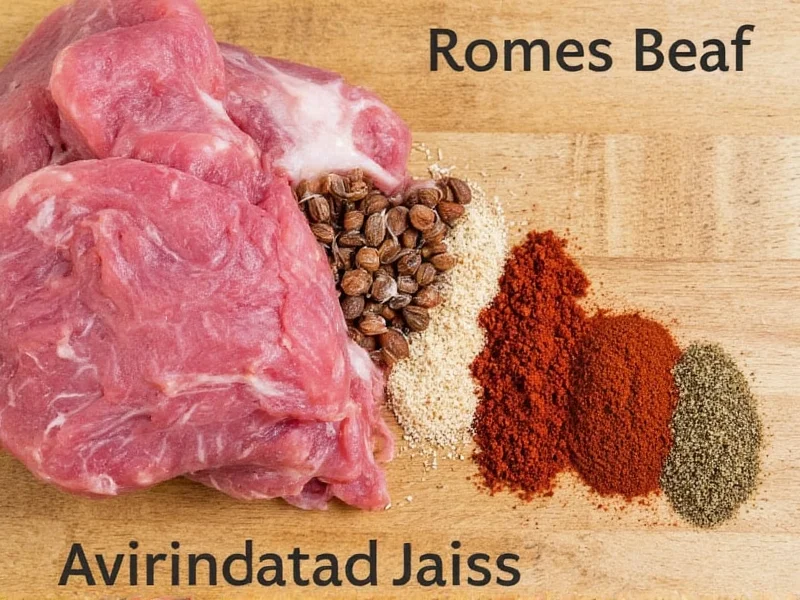When preparing corned beef, selecting the right spice blend transforms this humble cut of meat into a flavorful centerpiece. Understanding which spices work best together—and why—is crucial for achieving that perfect balance of warm, aromatic notes that define exceptional corned beef. Whether you're cooking for St. Patrick's Day or a weekend family dinner, the proper spice combination makes all the difference.
The Essential Corned Beef Spice Blend
A well-crafted spice blend does more than just add flavor—it enhances the natural qualities of the corned beef while balancing the saltiness from the curing process. The traditional combination works synergistically to create complex flavors that develop beautifully during the long, slow cooking process.
Core Spices and Their Roles
Each component in a proper corned beef spice mix serves a specific purpose in building the final flavor profile:
- Mustard seeds (yellow or brown): Provide a subtle tanginess and slight pungency that cuts through the richness of the beef
- Coriander seeds: Contribute citrusy, floral notes that brighten the overall flavor profile
- Black peppercorns: Deliver essential warmth and mild heat that complements the other spices
- Allspice berries: Offer complex notes reminiscent of cinnamon, nutmeg, and cloves in one spice
- Cloves: Add intense aromatic warmth (use sparingly as they can dominate)
- Bay leaves: Contribute earthy depth and subtle herbal notes
Traditional Corned Beef Spice Proportions
For a standard 3-4 pound corned beef brisket, use these precise measurements for optimal flavor balance:
| Spice | Measurement | Flavor Contribution |
|---|---|---|
| Mustard seeds | 1 tablespoon | Tangy, slightly pungent base note |
| Coriander seeds | 1 tablespoon | Citrusy, floral brightness |
| Black peppercorns | 1 tablespoon | Warmth and subtle heat |
| Allspice berries | 1½ teaspoons | Complex sweet warmth |
| Cloves | 8-10 whole | Intense aromatic depth |
| Bay leaves | 2-3 leaves | Earthy herbal foundation |
Alternative Spice Options for Customization
While the traditional blend delivers authentic flavor, these variations create distinctive profiles for different preferences:
- Smoky variation: Add ½ teaspoon smoked paprika or a small piece of chipotle pepper for depth
- Sweet variation: Include 3-4 crushed juniper berries and a cinnamon stick for subtle sweetness
- Spicy variation: Incorporate ¼-½ teaspoon crushed red pepper flakes for noticeable heat
- Herbal variation: Add 1 teaspoon dried thyme and ½ teaspoon dried rosemary for garden-fresh notes
Sourcing Quality Spices for Corned Beef
Freshness dramatically impacts the final flavor. For the best results when making your homemade corned beef seasoning:
- Purchase whole spices rather than pre-ground whenever possible—they retain flavor longer
- Buy from specialty spice shops or reputable online retailers for peak freshness
- Store spices in airtight containers away from light and heat
- Toast whole spices briefly in a dry pan before use to enhance their aromatic compounds
Many grocery stores sell pre-packaged corned beef spice packets, but these often contain fillers and preservatives. Creating your own blend ensures purity and lets you adjust flavors to your preference.
Proper Spice Application Techniques
How you use the spices affects flavor development:
- For raw corned beef: Rub 1-2 teaspoons of your corned beef spice blend proportions over the entire surface before cooking
- For the cooking liquid: Place all spices in a cheesecloth pouch or spice infuser directly in the pot
- Cooking time: Simmer spices with the beef for at least 3 hours to allow full flavor extraction
- Don't discard: Remove the spice pouch before serving, but keep it in the cooking liquid throughout preparation
Common Spice Mistakes to Avoid
Even with the right spices for corned beef recipe, these errors can compromise your results:
- Using pre-ground spices that have lost potency
- Adding too many cloves, which can make the dish bitter
- Skipping the toasting step for whole spices
- Removing spices too early in the cooking process
- Using old, stale spices that lack aromatic compounds
- Overcomplicating the blend with too many additional ingredients
Creating Your Perfect Blend
The beauty of making corned beef spice packet from scratch is customization. Start with the traditional proportions, then adjust based on your taste preferences. After your first attempt, consider these refinements for future batches:
- Increase coriander slightly for brighter citrus notes
- Add an extra bay leaf for deeper herbal complexity
- Reduce cloves if you find their flavor too dominant
- Incorporate a small piece of orange zest for subtle fruitiness
Remember that the salt content in commercially cured corned beef varies, so you may need to adjust cooking liquid accordingly. The spices should complement—not compete with—the meat's natural flavor.











 浙公网安备
33010002000092号
浙公网安备
33010002000092号 浙B2-20120091-4
浙B2-20120091-4